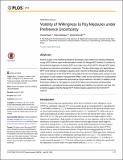Validity of willingness to pay measures under preference uncertainty
Date
20/04/2016Metadata
Show full item recordAbstract
Recent studies in the marketing literature developed a new method for eliciting willingness to pay (WTP) with an open-ended elicitation format: the Range-WTP method. In contrast to the traditional approach of eliciting WTP as a single value (Point-WTP), Range-WTP explicitly allows for preference uncertainty in responses. The aim of this paper is to apply Range-WTP to the domain of contingent valuation and to test for its theoretical validity and robustness in comparison to the Point-WTP. Using data from two novel large-scale surveys on the perception of solar radiation management (SRM), a little-known technique for counteracting climate change, we compare the performance of both methods in the field. In addition to the theoretical validity (i.e. the degree to which WTP values are consistent with theoretical expectations), we analyse the test-retest reliability and stability of our results over time. Our evidence suggests that the Range-WTP method clearly outperforms the Point-WTP method.
Citation
Braun , C , Rehdanz , K & Schmidt , U 2016 , ' Validity of willingness to pay measures under preference uncertainty ' , PLoS One , vol. 11 , no. 4 . https://doi.org/10.1371/journal.pone.0154078
Publication
PLoS One
Status
Peer reviewed
ISSN
1932-6203Type
Journal article
Description
This paper is part of the project ACCEPT, which is funded by the German Federal Ministry for Education and Research (grant number 01LA1112A). The publication of this article was funded by the Open Access fund of the Leibniz Association. All data is available on the project homepage (https://www.ifw-kiel.de/forschung/umwelt/projekte/accept) and from Figshare (https://dx.doi.org/10.6084/m9.figshare.3113050.v1).Collections
Items in the St Andrews Research Repository are protected by copyright, with all rights reserved, unless otherwise indicated.

